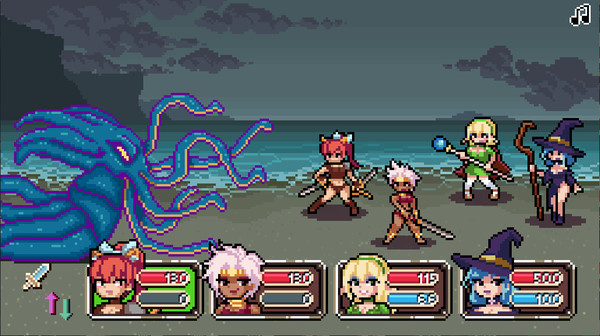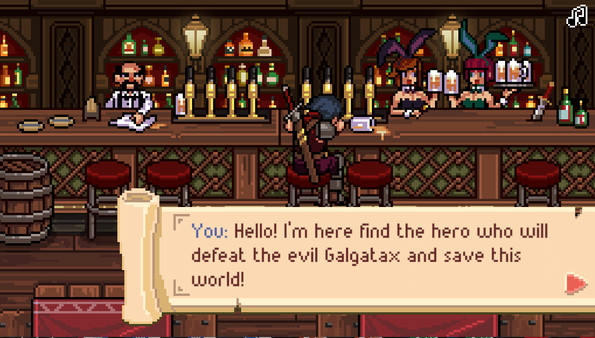It’s time to move on – Reflections of the first project and new directions
MARCH 25th – To say that year 2020 was tough is already a cliché but in our case, it was not only because of COVID-19. Releasing a company’s first game is always a result of hard work, and for us that also happened in 2020.
Our first game concept was started in 2017 and it was called Project Scoundrel. The idea was to develop a co-op RPG game that has a feeling of TTRPG in digital form. I loved the idea of a game that consists of short adventures that are easy to schedule with your friends also when your friends don’t live in the same city. I have always been a big fan of RPGs, especially old-school ones, but I just don’t have enough time to play games that require 100+ hours so the concept resonated well for me. We ended up adding a solo mode that makes it possible to play the game when your friends are not available or if you want to play solo, but also because for many publishers multiplayer-only games are too risky.
Finding a publisher for a game project is not easy. There are hundreds of games released on Steam every month so the competition is fierce not only after the game is released but also when you are pitching your project. In February 2019 we were on the edge of closing down the studio and at the same time I was also waiting for a final approval from the potential publisher. Luckily everything turned out well but getting a greenlight doesn’t mean that you can relax – it means that all the work is just about to begin. We needed to secure our part of the budget, as we were partly co-funding the project, and also on-board new people and start production.
When we started Project Scoundrel, we used an Open Game License (5e SRD) just to start making the demo fast to show the idea to the publishers. Because our goal was to make a game that is close to the TTRPG rule setting, getting the opportunity to use TDE universe and rules initially felt too good to be true. Well…be careful when you have that feeling. Reality hit later when there was less than a year to find the essence of the universe and decades worth of material. Also, seeing the comments of the earlier games developed with the same license didn’t ease these feelings at all but we had the vertical slice done when the project was signed and a greenlit to continue with that concept and tight schedule.
Some people say that your own game is like a baby, which makes you blind to its problems. We were doing the project full time and the founders sometimes also evenings and weekends. You certainly have a strong emotional connection to the game and that can sometimes lead to “developer blindness”. I played Book of Heroes over hundreds of hours and finally it was difficult to imagine yourself as someone who is seeing the game for the first time. Reading the comments was eye-opening but that should have happened before the release. Also, when you are making a multiplayer game, and especially procedurally generated, it is not the easiest one to test and there should have been more people testing it outside of the company. Everyone has the right to their opinion but seeing the reported issues after the hard work felt bad and something that could have been avoided by having external QA longer time in a project.
The game industry still has a certain glamour but behind the scenes it is hard business. A dream come true for me would have been to make a game that is popular enough to make DLCs, sequels and updates to avoid the insecurity of finding the funding for your next project. With a new company, you need to start with something but it is pretty clear that AAA is not the one to start with. Still too often your game is compared to the projects that have multiple times the size of budgets and teams. It can be frustrating after seeing the hard work of your team but understandable. I think our project would have benefited more to be a pure indie project without a license with existing fans wishing for a game that would have required a way bigger team and budget.
After the release we made a couple of patches to fix the reported problems but it soon became clear that it is not possible to continue doing that alone. Though there was encouraging feedback after every patch, the reality is that you need to have a big enough group behind the game that it is attractive enough to continue. When you have external funding, most of the time the game that you are making is also considered an investment that should cover the costs and bring profit. We have stopped the development from our part, at least until we’ll get more news on whether the project will continue. The toughest decision has been to let parts of our team go little by little. Even though that is unfortunately quite a common story in the game industry, when you have worked together and seen everybody’s dedication, it is never an easy decision.
So, the year 2020 was not the best year for us. We have continued working on another concept with a smaller team. World with online meetings and travel restrictions is not the easiest place to find new partners and though it is often said in different talks that mistakes are good for learning, time will tell if there are people to support you after them. Our new project is a humorous and colorful JRPG that can be described as “Feel-good, escapist roleplaying game adventure for when the real world is just too much”.
To sum it up, not all the games are successful but our first project taught us a lot – and gave us stories to tell about. Now it’s time to use all the learnings in a new project.
Kirsi Rossi, CEO of Random Potion
Ps.
Ignis Universia: Eternal Sisters Saga DX is free on Steam!








![The Year of Incline [2014] Codex 2014](/forums/smiles/campaign_tags/campaign_incline2014.png)
![The Year of Incline [2014] Codex 2014](/forums/smiles/campaign_tags/campaign_incline2014.png)

























